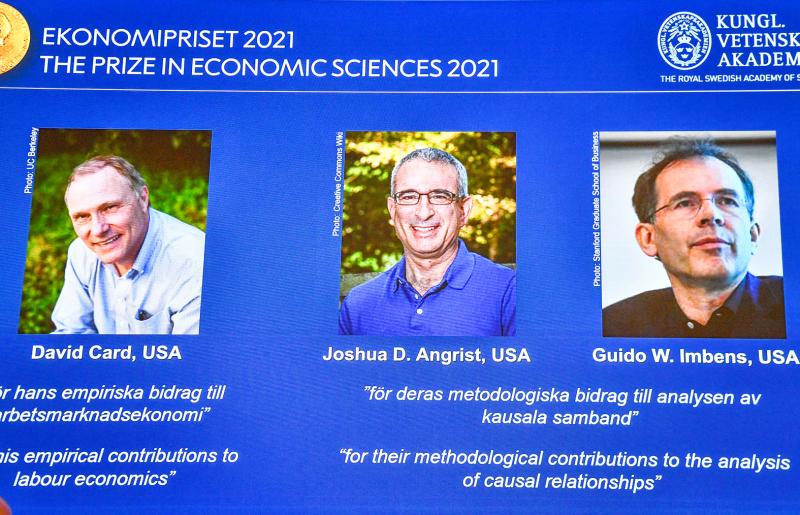Three US-based academics yesterday won the Nobel Prize in Economics for research that revolutionized empirical work in their field and brought better understanding of how labor markets work, the jury said.
Canadian David Card, Israeli-American Joshua Angrist and Dutch-American Guido Imbens shared the prize for providing new insights about the labor market and showing “what conclusions about cause and effect can be drawn from natural experiments,” the Nobel committee said in a statement.
Card’s work has focused on the labor market effects of minimum wages, immigration and education. Angrist and Imbens demonstrated how precise cause and effect conclusions can be.

Photo: Reuters
Half of the 10 million kronor (US$1.14 million) prize went to Card, a professor at the University of California, Berkeley, who was born in Canada in 1956, for his empirical contributions to labor economics.
The other half went jointly to Angrist, 61, a professor at the Massachusetts Institute of Technology, and Imbens, 58, a professor at Stanford University, “for their methodological contributions to the analysis of causal relationships.”
“I was absolutely stunned to get a telephone call,” Imbens told reporters during a telephone interview following the announcement.
“Josh Angrist was actually the best man at my wedding so he is a good friend, both professionally and personally, and I’m just thrilled to share the prize with him and David,” he said.
The three laureates “have revolutionized empirical work in economics. They have shown that it’s indeed possible to answer important questions, even when it’s not possible to conduct randomized experiment,” Nobel Committee member Eva Mork told reporters in announcing the prize.
The trio was honored for their work using so-called “natural experiments,” in which chance events or policy changes result in groups of people being treated differently, in a way that resembles clinical trials in medicine.
The economics prize, officially the Sveriges Riksbank Prize in Economic Sciences in Memory of Alfred Nobel, was the only prize not among the original five set out in the will of Nobel, who died in 1896. It was instead created through a donation from the Swedish central bank in 1968.
Just like this year, the economics prize has generally been male-dominated. It has only been awarded to two women in history, Elinor Ostrom in 2009 and Esther Duflo in 2019.

The Taiwanese passport ranked 33rd in a global listing of passports by convenience this month, rising three places from last month’s ranking, but matching its position in January last year. The Henley Passport Index, an international ranking of passports by the number of designations its holder can travel to without a visa, showed that the Taiwan passport enables holders to travel to 139 countries and territories without a visa. Singapore’s passport was ranked the most powerful with visa-free access to 192 destinations out of 227, according to the index published on Tuesday by UK-based migration investment consultancy firm Henley and Partners. Japan’s and

NATIONAL SECURITY THREAT: An official said that Guan Guan’s comments had gone beyond the threshold of free speech, as she advocated for the destruction of the ROC China-born media influencer Guan Guan’s (關關) residency permit has been revoked for repeatedly posting pro-China content that threatens national security, the National Immigration Agency said yesterday. Guan Guan has said many controversial things in her videos posted to Douyin (抖音), including “the red flag will soon be painted all over Taiwan” and “Taiwan is an inseparable part of China,” while expressing hope for expedited “reunification.” The agency received multiple reports alleging that Guan Guan had advocated for armed reunification last year. After investigating, the agency last month issued a notice requiring her to appear and account for her actions. Guan Guan appeared as required,

Japan and the Philippines yesterday signed a defense pact that would allow the tax-free provision of ammunition, fuel, food and other necessities when their forces stage joint training to boost deterrence against China’s growing aggression in the region and to bolster their preparation for natural disasters. Japan has faced increasing political, trade and security tensions with China, which was angered by Japanese Prime Minister Sanae Takaichi’s remark that a Chinese attack on Taiwan would be a survival-threatening situation for Japan, triggering a military response. Japan and the Philippines have also had separate territorial conflicts with Beijing in the East and South China

A strong cold air mass is expected to arrive tonight, bringing a change in weather and a drop in temperature, the Central Weather Administration (CWA) said. The coldest time would be early on Thursday morning, with temperatures in some areas dipping as low as 8°C, it said. Daytime highs yesterday were 22°C to 24°C in northern and eastern Taiwan, and about 25°C to 28°C in the central and southern regions, it said. However, nighttime lows would dip to about 15°C to 16°C in central and northern Taiwan as well as the northeast, and 17°C to 19°C elsewhere, it said. Tropical Storm Nokaen, currently